 Your new post is loading...
 Your new post is loading...

|
Scooped by
Mickael Ruau
July 29, 2024 11:21 AM
|
Créer des documents professionnels

|
Scooped by
Mickael Ruau
May 16, 7:10 AM
|
Publishing platform for digital magazines, interactive publications and online catalogs. Convert documents to beautiful publications and share them worldwide. Title: 250516 Iaf France Le Livre Blanc De La Facilitation (18 Pages), Author: Olivier REAUD, Length: 18 pages, Published: 2025-05-16

|
Scooped by
Mickael Ruau
March 19, 3:47 AM
|
Seminar training from the back of the room - Téléchargez le document au format PDF ou consultez-le gratuitement en ligne

|
Scooped by
Mickael Ruau
March 18, 3:22 AM
|
💶 Découvrez notre analyse approfondie des rémunérations des intervenants dans le supérieur à travers les grandes villes et différents domaines d'enseignement en France.

|
Scooped by
Mickael Ruau
February 27, 2:35 AM
|
Le post-it est un outil qui favorise l'organisation et la mémorisation en formation. Il facilite l'expression des idées ainsi que l'échange.

|
Scooped by
Mickael Ruau
February 25, 2:34 AM
|
"Training from the Back of the room" ou la méthode des 4 Cs est une approche pédagogique agile qui met les apprennats au coeur.

|
Scooped by
Mickael Ruau
February 20, 2:19 AM
|
Enseigner à un grand groupe de 75 ou 100 élèves n'est jamais une chose facile à faire. Vous ne pouvez pas forcément vous assurer que tout le monde ait compris.

|
Scooped by
Mickael Ruau
February 19, 2:17 AM
|
Dans cet article, nous avons décidé de vous présenter les meilleurs outils afin de réaliser les plus belles présentations possibles. Tous ces outils peuvent servir pour différentes utilisations, à vous de les adapter en fonction de votre cours.

|
Scooped by
Mickael Ruau
February 17, 2:16 AM
|
Vous choisissez la sécurité en optant pour la coopération. C'est en général un format qui est préféré dans le domaine de l'enseignement. La perspective actionnelle est d'autant plus mise en avant et la réflexion à plusieurs pousse à la pro activité. De plus, les interactions sont souvent plus calmes et plus sereines.
Pour mettre en place cette coopération, rien de mieux qu'un bon jeu de rôle. À vous d'orienter le jeu comme vous le souhaitez avec des postes différents (assistant, PDG, médiateur). L'intervenant peut choisir de distribuer lui-même les rôles ou bien de laisser les étudiants faire leur propre simulation.
Par la suite, leur objectif est de travailler ensemble en utilisant de nombreux outils pédagogiques (Trello, Coggle, Canva). C'est ici leur organisation qui sera jugée et la façon dont ils feront sortir les informations les plus importantes du sujet sur lequel ils travaillent. En coopération, ils pourront également mettre en place leurs propres systèmes de récompenses.
Au final, il n'y a pas de meilleur ou de moins bon système à utiliser. La compétition est à double tranchant et ce n'est pas quelque chose que vous pourrez faire avec toutes vos classes. Cependant, si la classe est réceptive, vos élèves se donneront à 100 % pour être les meilleurs possibles. La coopération, elle va faire ressortir l'intelligence collective de vos apprenants. C'est à vous de décider ce qui correspondra le mieux à vos étudiants.

|
Scooped by
Mickael Ruau
February 15, 2:12 AM
|
Lorsque vous intervenez dans le supérieur, vous avez le choix de dispenser différents types de cours. Nous avons décidé de vous faire une liste non exhaustive des différentes façons d'intervenir.

|
Scooped by
Mickael Ruau
February 13, 2:15 AM
|
Il existe 5 types de grandes méthodes pédagogiques. Celle que nous allons voir dans cet article est la méthode expositive. Pour simplifier, c'est celle qui se rapproche le plus d'un cours magistral.

|
Scooped by
Mickael Ruau
February 12, 2:14 AM
|
Il existe 5 types de grandes méthodes pédagogiques. Celle que nous allons voir dans cet article est la méthode démonstrative. Ce qui va varier ici, c'est la façon dont le cours est mis en place.

|
Scooped by
Mickael Ruau
February 10, 2:30 AM
|
Hautement interactives, ces techniques tirent parti des avancées des neurosciences et permettent, de manière simple, efficace, de stimuler l’activité cérébrale des apprenants et facilitent grandement la transmission ET l’acquisition des connaissances. De fait, cet enseignement s’apparente au courant de pensée de Montessori qui s’appuie sur le respect du rythme de l’apprenant, sur l’apprentissage en autonomie et sur la prépondérance des périodes sensibles de l’apprenant (on parle, pour les enfants âgés de moins de 6 ans, « d’esprit absorbant », à savoir leurs facultés à observer, comprendre puis faire par eux-mêmes).
|
À l'heure où l'intelligence artificielle et avant le métavers envahissent le secteur de la formation, une approche radicalement différente émerge dans le paysage du digital learning.
Via Cap Métiers Nouvelle-Aquitaine

|
Scooped by
Mickael Ruau
March 20, 3:37 AM
|
Formation aux méthode agiles. Formez-vous aux méthodes Agiles avec nos cours et classes virtuelles 100% en ligne et notre plateforme.

|
Scooped by
Mickael Ruau
March 18, 3:38 AM
|
Formation aux méthode agiles. Formez-vous aux méthodes Agiles avec nos cours et classes virtuelles 100% en ligne et notre plateforme.

|
Scooped by
Mickael Ruau
March 5, 2:37 AM
|
Les sept clés que cette méthode permet d’actionner pour mettre en place une pédagogie agile et ainsi favoriser un apprentissage optimal.

|
Scooped by
Mickael Ruau
February 26, 2:45 AM
|
Un site internet du comité pour la science ouverte - coso

|
Scooped by
Mickael Ruau
February 24, 2:49 AM
|
In this article, Philly Lander shares what training from the back of the room is, some top tips and her experiences with it.

|
Scooped by
Mickael Ruau
February 20, 2:18 AM
|
On retrouve parmi les méthodes pédagogiques de nombreux formats plus ou moins efficaces. Aujourd'hui, nous allons parler de la classe inversée, une approche qui se répand de plus en plus dans l'enseignement.

|
Scooped by
Mickael Ruau
February 18, 2:17 AM
|
Dans cet article, nous avons décidé de vous présenter les meilleurs outils afin de réaliser des quiz avec vos apprenants. Tous ces outils peuvent servir pour différentes utilisations, à vous de les adapter en fonction de votre cours.

|
Scooped by
Mickael Ruau
February 15, 2:20 AM
|
💶 Pour un cours, les établissements rémunèrent généralement leurs intervenants entre 30 et 120€/h. 💶
Un grand écart. Le montant varie selon le niveau des étudiants, la taille des classes, la localisation et la politique des établissements.

|
Scooped by
Mickael Ruau
February 14, 2:15 AM
|
Il existe 5 types de grandes méthodes pédagogiques. Celle que nous allons voir dans cet article est la méthode active, dite "de découverte". Les rôles de l'apprenant et de l'intervenant sont ici totalement modifiés.

|
Scooped by
Mickael Ruau
February 12, 2:32 AM
|
Découvrez l'approche 'Training from the back of the room', une méthode d'enseignement révolutionnaire qui place l'apprenant au cœur de la formation.

|
Scooped by
Mickael Ruau
February 11, 2:13 AM
|
Si vous commencez à donner des interventions dans l'enseignement supérieur, vous allez devoir apprendre à captiver votre auditoire. Ce n'est pas forcément un talent inné pour tout le monde, mais ne vous en faites pas, ça se travaille.

|
Scooped by
Mickael Ruau
February 10, 2:10 AM
|
Dans le monde de la pédagogie, c'est une bonne chose de savoir varier les formes d'apprentissage. Aujourd'hui, nous avons décidé de vous présenter ce qu'est la gamification.
|



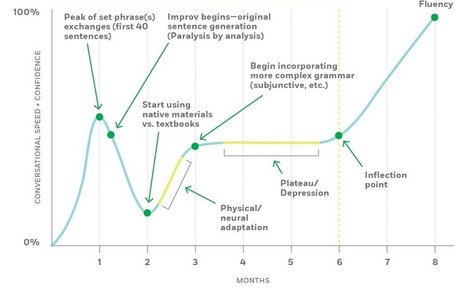


 Your new post is loading...
Your new post is loading...
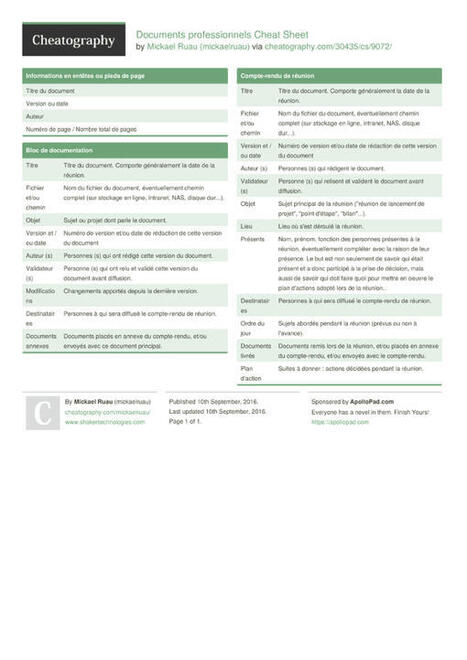










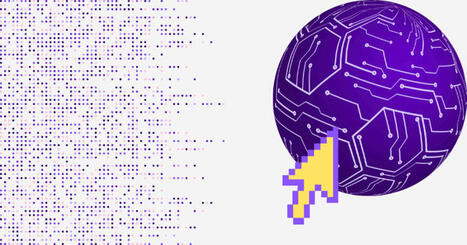




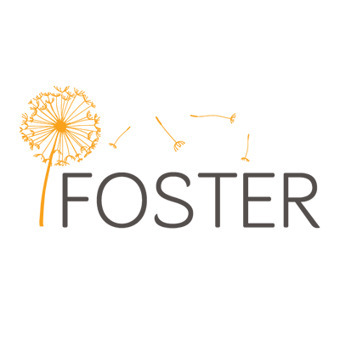

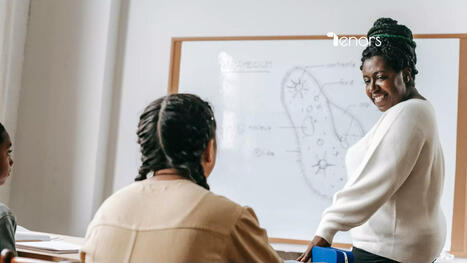
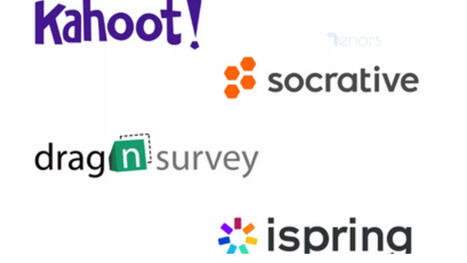









The journey of learning as a developer might be different for each person. It's very hard to test empirically how it works given the huge amount of variable there is. In my case, I started programming with absolutely no background and that can be a good experience to tell.
Let's assume a developer with no background whatsoever that starts programming by curiosity. The speed can vary according to the place the developer lives and other aspects of their personal life. But for the purpose of this post, let's use the time scale of years and call each of them as a "milestone".
In year 1, everything is new. The developer doesn’t understand exactly why things work and they don’t really care that much. They only know that if they follow a step-by-step tutorial they can get something working. The idea is to Google everything and to try to "fit" the code into the existing project.
The year 1 milestone heavily relies on copy/paste and Cargo Cult Programming. The occurrence of bugs is high; the code quickly becomes unmaintainable, and performance goes down as there’s no online recipe to follow for a custom edge case that eventually shows up.
In year 2, the developer understands the syntax and what most of the copy/pasted code does. There's still some magic happening and some Cargo Cult, albeit at a very different level than year 1.
The occurrence of bugs is still high; the developer starts to spot bad code from one year ago, only to realize he or she was the one who wrote it (which is a positive signal — it means they learned something); and performance still goes down as complexity keeps increasing, albeit at a lower rate than before.
From years 3 to 5, the developer understands the point of underlying primitive data structures. If they use Java, for example, they start understanding the purpose of Collection, List, and Array but start using those structures for everything. When they learn a new concept or technique, they also try to apply it everywhere.
This is the phase of “When you have a hammer, everything looks like nails”.
There’s not much copy/pasted code anymore but Cargo Cult still happens when applying a concept (such as Clean Code or SOLID). Most of the time the concept is applied in the wrong way, like applying Test-First instead of TDD.
They might understand the need for testing the code but don't necessarily apply it or understand the "why". They try to do it but find it extremely counter-productive. They eventually decide to make small tests that cover a small portion of the application, because if they try to cover more than that, they will find themselves trapped in a bunch of unmaintainable test code which will contain a lot of false positives, false negatives and side-effects.
From years 5 to 7, the developer starts understanding better the point of fundamentals. They also start applying some concepts correctly, like TDD instead of Test-First. The syntax is not an issue anymore, they've reached enough fluency in their favorite languages and can learn a new one quickly. Cargo Cult and copy/paste rarely happen.
They can create big test suites without becoming too complex, although they still might have trouble to make it extensible and easy to change. Mocks and Stubs are still being used excessively and in the wrong scenarios. Coverage is not 100%.
From year 7 and onwards, the developer starts to understand better the fundamentals of language-agnostic concepts. In my case, and from other developers I know, it was Event-Sourcing and the architectural ideas of Event-Driven Design, Domain-Driven Design, CQRS and (Roy Fielding’s) REST. They might have discovered by themselves or learned the agile principles over time and started learning about other areas like Math, Physics, Philosophy and Psychology in order to innovate on top of software development.
They also start learning other programming paradigms and measuring the tradeoffs of each technology or concept for the task at hand. Nothing is a silver bullet anymore and they understand discussions are necessary to reach the right answer.
The journey sounds really slow. And it should!